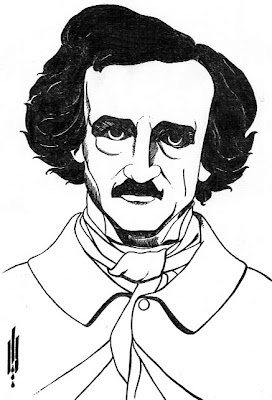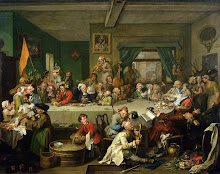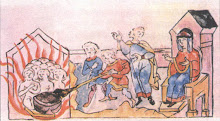
From the beginning of his writing career, Poe had a fascination (a monomania, according to Charles F. Briggs) with the subject of plagiarism, which he chronicled in his usual take-no-prisoners fashion. His obsession reached its culmination early in 1845, when he kicked off what he called his “Little Longfellow War,” a series of columns he wrote for various New York publications, most notably his “Broadway Journal.” Using his trademark combination of mockery, erudition, and, at times, unbelievably painstaking detail, he set out to prove that several prominent poets—most notably Henry Wadsworth Longfellow—were unoriginal writers who built their careers by heavily relying on the work of others.
As Longfellow was one of the most affectionately popular poets of his time (particularly with the Bostonian set,) Poe’s campaign, as he would put it, “kicked up a bobbery”—which, of course, was exactly his intention. Sincere as he was about his insistence on “originality” in literature, (and many critics have conceded that he had a point about Longfellow,) Poe was an instinctive publicist. The gleeful, hyperbolic tone he showed throughout the “Longfellow War” was not—as far too many of his biographers assume—a sign of his ongoing mental collapse. It was evidence that he knew he had found a way to draw attention to himself and his own projects (particularly the fledgling and financially-strapped “Broadway Journal,”) while having a lot of fun scourging unworthy literary idols in the process.
While a number of Longfellow’s friends and allies came to his defense against this puckish onslaught (largely by making personal attacks against Poe) the most interesting rebuttal came from a source whose true identity is still unresolved. On March 1 1845, Nathaniel Parker Willis’ “Evening Mirror” published a lengthy letter from someone calling himself “Outis” (ancient Greek for “nobody.”)
“Outis” was replying to Poe’s January 25 review of Longfellow’s “The Waif,” a collection of poems largely written by others. Poe compared James Aldrich's poem, "A Death-Bed" to Thomas Hood’s “The Death-Bed” and concluded “somebody is a thief.” Longfellow’s volume, according to Poe, was “full of beauties,” but “infected with a moral taint.” He added mischievously that he noted “a very careful avoidance of all American poets who may be supposed especially to interfere with the claims of Mr. Longfellow. These men Mr. Longfellow can continuously imitate (is that the word?) and yet never even incidentally commend.”
“Outis” countered by declaring that just because there might be “identities” between two poems, that did not necessarily mean that any conscious fraud was involved. “Did no two men ever think alike without stealing one from the other?...did no two men ever use the same, or similar words, to convey the thoughts, and that, without any communication with each other?...It is a thing of every day occurrence.”
As an example, he cited Poe’s “The Raven.” “Who, for example, would wish to be guilty of the littleness of detracting from the uncommon merit of that remarkable poem…by charging him with the paltriness of imitation? And yet, some snarling critic, who might envy the reputation he had not the genius to secure for himself, might refer to the frequent, very forcible, but rather quaint repetition, in the last two lines of many of the stanzas, as a palpable imitation of the manner of Coleridge, in several stanzas of the Ancient Mariner.”
After stating blithely, “Now I shall not charge Mr. Poe with plagiarism…” “Outis” went on to do precisely that, describing in detail the “identities” between Poe’s famed raven and an anonymous poem, “The Bird of the Dream.”
He finished by stating that although he was acquainted with Longfellow, he was writing out of “no personal motives, but simply because, from my earliest reading of reviews and critical notices, I have been disgusted with this wholesale mangling of victims without rhyme or reason.”
One week later, Poe responded in the “Broadway Journal.” A sign that he was not taking his adversary very seriously could be seen in his editorial’s subheading: “A large account of a small matter—A voluminous history of the little Longfellow war.”
Poe began by mentioning another recent defense of Longfellow, noting that this “very luminous friend” “defended Mr. L., not only from the one-tenth of very moderate disapproval in which I had indulged, but from the nine-tenths of my enthusiastic admiration into the bargain.”
In a similarly teasing way, he summarized more published attacks on his “Waif” review—thus, of course, giving himself the opportunity to repeat his charges—and then turned to “Outis.” He repeated the “Outis” rebuttal in full, commending “the gentlemanly grace of its manner, and the chivalry which has prompted its composition. What I do not admire is all the rest. In especial, I do not admire the desperation of the effort to make out a case.” He loftily declared that he would not “insult” Longfellow’s self-appointed champion by treating his “abominable rigmarole as anything better than a very respectable specimen of special pleading.”
His efforts to publicize what he saw as blatant plagiarism did not, he said, stem from “carping littleness,” but “strictly honorable and even charitable” motives. He observed that a plagiarist would be apt to steal from an obscure author. If the similarities between the two works were detected, the “distinguished man” would naturally be given the benefit of the doubt, and the lesser-known writer would be accused of the theft. “Now then the plagiarist has not merely committed a wrong in itself—a wrong whose incomparable meanness would deserve exposure on absolute grounds—but he, the guilty, the successful, the eminent, has fastened the degradation of his crime…upon the guiltless, the toiling, the unfriended struggler up the mountainous path of Fame. Is not sympathy for the plagiarist, then, about as sagacious and about as generous as would be sympathy for the murderer whose exultant escape from the noose of the hangman should be the cause of an innocent man’s being hung?”
Poe continued his dissection of “Outis” in the March 15 “Journal.” “Here,” he observed, “is a gentleman who writes in certain respects as a gentleman should, and who yet has the effrontery to base a defense of a friend from the charge of plagiarism, on the broad ground that no such thing as plagiarism ever existed. I confess that to an assertion of this nature there is no little difficulty in getting up a reply.”
Being Poe, of course he managed to do so. He repeated his observation that plagiarists are often established authors who victimize unknowns. “For the plagiarist is either a man of no note or a man of note. In the first case, he is usually an ignoramus, and getting possession of a rather rare book, plunders it without scruple, on the ground that nobody has ever seen a copy of it except himself. In the second case (which is a more general one by far) he pilfers from some poverty-stricken, and therefore neglected man of genius, on the reasonable supposition that this neglected man of genius will very soon cut his throat, or die of starvation (the sooner the better, no doubt,) and that in the mean time he will be too busy in keeping the wolf from the door to look after the purloiners of his property—and too poor, and too cowed, and for these reasons too contemptible, under any circumstances, to dare accuse of so base a thing as theft, the wealthy and triumphant gentleman of elegant leisure who has only done the vagabond too much honor in knocking him down and robbing him upon the highway.”
He agreed with “Outis’s” assertion that it was possible for two writers to independently come up with similar thoughts and expressions “and would request my friends to get ready for me a strait-jacket if I did not.” However, “do I rightly comprehend Outis as demonstrating the impossibility of plagiarism where it is possible, by adducing instances of inevitable similarity under circumstances where it is not?...He wishes to show, then, that Mr. Longfellow is innocent of the imitation with which I have charged him, and that Mr. Aldrich is innocent of the plagiarism with which I have not charged him; and this duplicate innocence is expected to be proved by showing the possibility that a certain, or that any uncertain series of coincidences may be the result of pure accident.”
Poe concluded his analysis of “Outis’s” “labyrinth of impertinences” by stating that he would continue the subject in the following “Journal,” promising “interesting developments” before he was done.
Accordingly, the March 22 “Journal” found him addressing “Outis’s” suggestion that Poe himself was a plagiarist. He imagined what “Outis” was thinking when he made the charge: “I am perfectly well aware, to be sure, that the only conceivable resemblance between Mr. Bryant’s poem and Mr. Poe’s poem, lies in their common reference to a raven; but then, what I am writing will be seen by some who have not read Mr. Bryant’s poem, and by many who have never heard of Mr. Poe’s, and among these classes I shall be able to do Mr. Poe a serious injustice and injury, by conveying the idea that there is really sufficient similarity to warrant that charge of plagiarism, which I, Outis, the ‘acquaintance of Mr. Longfellow,’ am too high- minded and too merciful to prefer.” He added, “By showing that I have committed a sin, he proposes to show that Mr. Aldrich and Mr. Longfellow have not.” As for “Outis” “imposing upon one or two grossly ignorant readers” by suggesting that Poe borrowed from Coleridge, Poe made a detailed analysis of the two poems in question, showing their utter dissimilarity in rhythm, metre, stanza, and rhyme. He dismissed “Outis’s” example of “The Bird of the Dream” by replying that the similarities to “The Raven” imagined by “Outis” simply did not exist. He also strongly hinted that this poem was an invention of “Outis” himself.
Poe closed his lecture by repeating his plagiarism claims about the poems of Aldrich and Hood, although he shrugged, “who is the original and who is the plagiarist, are points I leave to be settled by any one who thinks the matter of sufficient consequence to give it his attention.”
Next post: The end of the Longfellow War, and the beginning of a literary guessing game.















